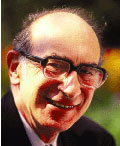Harry Keen, MD
1925 — 2013

Harry Keen, a pioneer of research in diabetes and cardiovascular diseases, graduated from St. Mary’s Hospital Medical School in 1948 and continued his training there with George Pickering. Doing what he characterized as “grunt-work” for Pickering, Keen spent several years measuring blood pressure in all diabetics on the service and all of their first-degree relatives. This initial foray into diabetes research sparked what would become a lifelong academic passion. In 1960 he took a research fellowship at NIH, an experience that he credits for the beginning of the most productive part of his career. (1)
He began a lifetime professional relationship with Guys Hospital in 1961, where he was consultant and Professor of Human Metabolism until retirement in 1990. By 1963, he found that many diabetics had small amounts of urinary albumin and he is largely responsible for introducing and understanding the importance of microalbuminuria. (2) In 1978 he and John Pickup developed the first pump for continuous subcutaneous insulin infusion.
Based on findings from the Bedford and Whitehall studies his research team developed the concept of impaired glucose tolerance and showed that in nondiabetic subjects milder degrees of hyperglycemia are associated with increased risk of cardiovascular diseases.
In 1980 Keen chaired the WHO Expert Committee on Diabetes Mellitus which defined the blood glucose criteria for the diagnosis of diabetes and impaired glucose tolerance. With further refinements these criteria have formed the basis for research in the epidemiology of diabetes.
At the turn of the century, Keen wrote a general message to the diabetes community saying, “Education, in its broadest sense, is the weapon to defeat diabetes. . .Much of diabetes care consists of doing simple things well. But they must be well taught and well understood.” (3) He pioneered development of UK Diabetes Centers and gives the Diabetes UK (the British Diabetic Association) credit for improving the communication and equity between diabetics and their medical authorities. He remains active in retirement as honorary professor at Warwick University. (EH/HB)
Sources
1. Interview with Harry Keen, conducted 21 November 2006. http://www.diabetes-stories.com/interview.asp?UID=52. Accessed 15 July 2010
2. Robert Tattersall. Diabetes: The Biography. Oxford University Press, New York. 2009. pp. 110.
3.http://www2.warwick.ac.uk/fac/med/study/cpd/subject_index/diabetes/wdc/about/keen/. Accessed 2 August 2010
Kalevi Pyorala